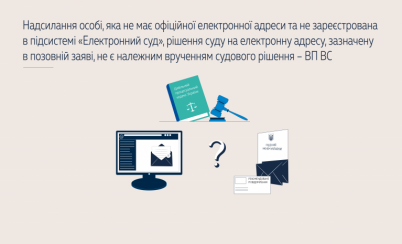Contact center of the Ukrainian Judiciary 044 207-35-46

Sending a judgment by e-mail to the address specified by the applicant in the procedural pleadings filed with the court (statement of claim, appeal and/or cassation complaint, statements / motions), which contain a request to send copies of procedural pleadings to an e-mail that is not official, cannot be considered proper service of the judgment and confirm the day of service.
The provisions of the Civil Procedural Code of Ukraine, which establish the procedure for sending copies of a court decision to a person who does not have an official email address and is not registered in the E-Court subsystem, indicate that the court is obliged to send copies of the court decision by registered mail with acknowledgement of receipt, the day of delivery being the day the mail is marked as having been served.
This was emphasized by the Grand Chamber of the Supreme Court.
According to the circumstances of the case, on 2 February 2023, the plaintiff lodged an appeal with the court, in which, among other things, she asked the court to renew the term for appealing the decision of the court of first instance dated 27 December 2022, since this court did not send her a copy of the contested court decision, and she learned about the decision itself from the Unified State Register of Court Decisions on 29 January 2023.
The court of appeal refused to open the appeal proceedings. This court noted that the plaintiff missed the deadline for appealing, as the contested decision of the first instance court was sent to her email address on 27 December 2022, so the grounds for renewal of such a deadline provided by the applicant cannot be recognised as valid.
Instead, the Grand Chamber of the Supreme Court drew attention to the fact that the procedural legislation in force at the time when the court of first instance made the decision provided for two ways of sending a court decision: sending by registered mail with acknowledgement of receipt and sending electronically through the ‘’E-Cabinet‘’ subsystem, including by sending a letter to the official e-mail using the Unified Judicial Information and Telecommunication System in cases provided for in para. 37, Chapter 2, Section III of the UJITS Regulation.
The intention of a party to a case (individual) to indicate a personal email address in a complaint (application) only indicates his/her desire to receive correspondence from the court by an additional means of communication. This does not relieve the court of the obligation to comply with the requirements of the law, in particular, to send the court decision in accordance with the procedure provided for in Article 272 of the Civil Procedural Code of Ukraine (as amended at the time of the decision by the court of first instance).
As noted by the Grand Chamber of the Supreme Court, the analysis of the provisions of the Civil Procedural Code of Ukraine, which establish the procedure for sending copies of a court decision to a person who does not have an official email address, indicates that the court is obliged to send copies of the court decision by registered mail with acknowledgement of receipt, the day of delivery being the day the mail is marked as having been delivered.
Sending procedural documents to the email address of the party to the case specified in the documents submitted to the court is not prohibited and may be done as an additional action. However, such actions cannot replace the proper sending of the court decision in accordance with Article 272 of the Civil Procedural Code of Ukraine (as amended at the time of the decision of the court of first instance).
In this case, at the time of the plaintiff's appeal to the court (July 2022) and the court of first instance's decision (27 December 2022), the UJITS subsystems (modules) ‘’E-Cabinet‘’, ‘’E-Court‘’ and the video conferencing subsystem were operational.
The court of first instance considered the case on the basis of paper materials. The Grand Chamber of the Supreme Court took into account that part 11 of Article 272 of the Civil Procedural Code of Ukraine (as amended at the time of the decision of the court of first instance) provided that in case of consideration of the case on paper, court decisions are sent in paper form by registered letter with acknowledgement of receipt, and the case file did not contain evidence of the plaintiff's registration in the E-Court subsystem.
Therefore, the Grand Chamber of the Supreme Court concluded that in this case, the court of first instance was obliged to send the plaintiff the judgment in paper form by registered mail, and the certificate of delivery of the email to her email address within the meaning of Article 272 of the Civil Procedural Code of Ukraine (as amended at the time of the decision of the court of first instance) does not indicate that a copy of the judgment was duly served on the plaintiff.
The Resolution of the Grand Chamber of the Supreme Court of 10 April 2024 in case No. 454/1883/22 (proceedings No. 14-117öñ23) - https://reyestr.court.gov.ua/Review/118486335.
This and other legal positions of the Supreme Court can be found in the Database of Legal Positions of the Supreme Court - https://lpd.court.gov.ua.